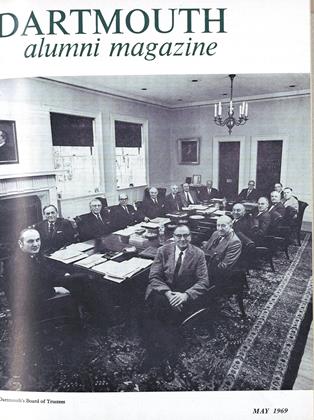THEY'LL turn out on May 17 in Alumni Hall to honor Dr. Joe Pollard '23 as the man who has been physician to countless Dartmouth athletes for 35 years. Doc Pollard retires in June and as the words of honor and praise flow, the tale of his perfect attendance at every Dartmouth football game since 1934 will probably be retold many times.
As the gun sounded at Franklin Field in Philadelphia last November, marking the end of the 1968 season, Doc Pollard turned from the sidelines for the 310th time. For all the games he's seen, though, Doc periodically thinks of one he almost missed.
It was back during World War II and Dartmouth was to play at Cornell. The team boarded the train at White River Junction while Doc and a manager stood on the platform. Before they realized what was happening, the train began to move. "The manager began to run and hopped aboard," said Doc, "and I finally caught up with the last car but the train was moving too fast for me to get aboard so I let go." (He was left with a game leg following two operations to remove a brain tumor just as he was finishing medical school.)
"I watched the train, with the team, go on its way and began to figure how I would catch up," said Doc. It took a series of bus rides across Vermont and upstate New York before Doc was reunited with the squad in Syracuse on the morning of the game.
Dr. Pollard was supposed to retire in 1966 but Hitchcock Clinic officials requested that he continue as team physician until a replacement was found. And so he has for these past three years. Now he'll step down after a career that began long before Dartmouth's current undergrads were born.
He has seen and known more Dartmouth athletes than anyone in Hanover. He also has spanned nearly four decades of progress in medicine and especially the treatment of athletic injuries.
"For all the books you read and lectures you hear, there's no substitute for experience," said Fred Kelley, Dartmouth's head trainer and a man who is with Doc Pollard nearly every day. "It's an education for me to watch him. Doc has worked with so many athletic injuries that his diagnosis on the extent and treatment of an injury is usually perfect, or pretty darned close."
Dr. Pollard followed his father, Dr. Charles W. Pollard '95, to Dartmouth. He was "a rather immobile guard and tackle" on football teams coached by Dr. Clarence (Fat) Spears and Jackson Cannell and easily recalls the days when he -treated his own knees with heat ("they were injured most of the time") and was ready for play on Saturday.
Following his years at Dartmouth and Dartmouth Medical School, he went on to Columbia's College of Physicians and Surgeons. It was during his final year of med school that he married Alice Hickey, a Wellesley girl, and then was felled by the tumor and delicate surgery that left him with more than two years of recuperation. The Pollards moved to Hanover and following his recovery, Dr. Pollard completed his internship at Mary Hitchcock Hospital. He then accepted the suggestion of Dr. Jack Bowler '15 to succeed Dr. Bowler's father, who was retiring as Dartmouth's team physician. The streak was begun.
Dr. Pollard has seen many developments in his long medical career. "Most athletes aren't as well conditioned as they were in the days of two-way football and when young men did more walking and were involved in more physical work than they are today," he commented. "Serious head injuries in football and other contact sports are much less common due to improvements in equipment. On the other hand, knee injuries are much more prevalent because the human body simply isn't as well conditioned to withstand the demands of modern athletics.
"One of the greatest advances in athletics has been the recognition of sports injuries as a specialized area in medicine. This has led to much progress, particularly in the field of orthopedic surgery."
When Doc was scheduled to retire in 1966 but didn't, the Pollard record for Dartmouth fooball games viewed stood at 283 straight. Well, the Pollard record is now 310. While that will represent his record in an official capacity with Dartmouth teams, Doc's career as an "unofficial" observer is about to begin. Who knows when that will end?
Dr. Joe Pollard '23
 View Full Issue
View Full Issue
More From This Issue
-
 Feature
FeatureMutual Sensitivity Wins the Day
May 1969 By JOHN DICKEY -
 Feature
FeatureWebster and the Court
May 1969 By THE HONORABLE EARL WARREN -
 Feature
FeatureWarner's 41 Dramatic Years
May 1969 By MARGARET BECK McCALLUM -
 Feature
FeatureMay 17 Event to Salute Eleazar's Starting Point
May 1969 -
 Books
BooksERNEST HEMINGWAY: A LIFE STORY
May 1969 By JEFFREY HART '51 -
 Article
ArticleThe Undergraduate Chair
May 1969 By CHRIS KERN '69
J.D.
-
 Article
ArticleA Swimming Era Ends
MAY 1970 By J.D. -
 Article
ArticleWayne Pirmann: Problem Solver
NOVEMBER 1970 By J.D. -
 Article
ArticleA Wizard Called Oz
JUNE 1971 By J.D. -
 Article
ArticleFreshman Eligibility Affects Hockey Slate
DECEMBER 1971 By J.D. -
 Feature
FeatureCollege Staff Members Reach Retirement
JULY 1972 By J.D. -
 Article
ArticleDCAC Official Reaches Retirement
JULY 1972 By J.D.







